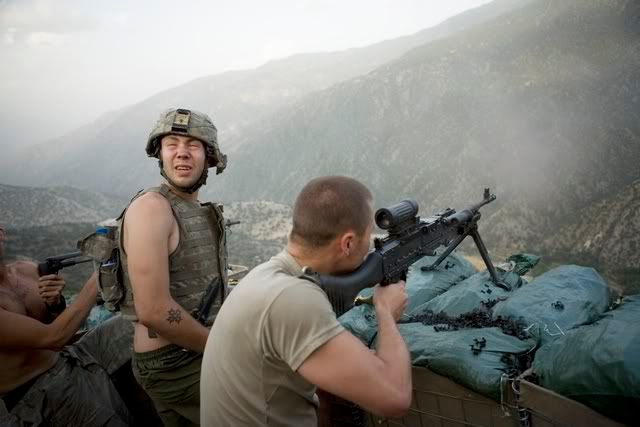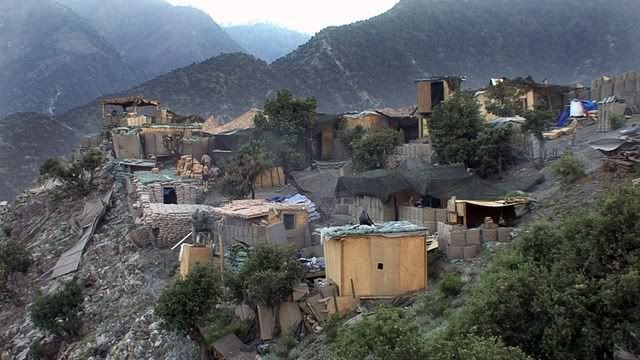
Screening at Edinburgh International Film Festival, the documentary feature Restrepo deals with the Second Platoon, Battle Company, 173rd Airborne Brigade, stationed in Afghanistan during a 15-month deployment which sees several of them killed and most of the survivors left with what seems like lasting psychological damage. Audiences may feel some small portion of that emotional turmoil after being exposed to it.
First-time directors Tim Hetherington and Sebastian Junger achieve what seems like near-total access to the American side and capture images of combat comparable to those of William Wyler's Memphis Belle and Thunderbolt in their hair-raising reality and sense of peril. The only aspect of the situation on the ground we're unable to see is the enemy's side of things. And of course, the embedded perspective robs us of any overview of the political causes of the war. In this sense, the movie resembles Kathryn Bigelow's fictional Iraq movie The Hurt Locker: there's also similarity in the sense of basically decent and ordinary men being pushed towards psychological collapse by intolerable stress, in an environment they can't hope to understand.

The particular mission these men are on is to establish American control of the Korangal Valley, a mountainous stretch of Afghan terrain where 70% of the total ordnance used in the entire conflict has been deployed. The government hopes to build a road (thereby winning hearts and minds). But the Taliban forces control much of the valley, the Americans are taking fire every single day, and their air-strikes tend to result in civilian casualties, making their doubtful welcome from the locals progressively more strained. The commander's plan, basically, is to kill all the enemy in the first two months, so that the next thirteen will be peaceful. It's a good plan, as far as it goes...
The film derives its title from a double source. "Doc" Restrepo is a soldier killed, offscreen, early in the story. And OP (Outpost) Restrepo is an advance base set up by the soldiers further into the valley than they have previously been able to secure. They set off at night, find the spot from which most of the enemy attacks have been launched, and dig a hold. Fortifying their position, they fend off attacks all day, then return to digging. As the year goes on, OP Restrepo grows and becomes more fortified. The soldiers come to regret naming such a wretched establishment after a fallen friend. But later, they come to respect their base. None, hoewever, are sorry to leave.
Shortly after the platoon leaves, the Americans withdraw from the valley altogether.
As with the Bigelow film, the rituals of military and masculine behavior are examined, and the seductive beauty of warfare is displayed. The film is clearly respectful of the soldiers placed in such a terrifying situation (several of whom helped gather footage for the movie while carrying out their military duties). Questions about whether these guys should be in this country at all are left for the audience to ask. Instead of an examination of the underlying issues, what is delivered is an insight into what it's like to fight a war. If you can accept these limitations, the film is an incredible experience, a you-are-here immersion in the chaos of battle (although the scenes of hand-held thrashing and blasting are still more visually coherent than the average Paul Greengrass action sequence). The characters, seen both in action and in interview after the fact, gradually engage, displaying a variety of symptoms of nervous strain brought on by their suffering: the unnerving thousand-yard-stare of McDonaugh is impressively disturbing, but the constant anxious smile of Cortez carries a haunting emotional impact. Nobody will shed a tear before the camera.

